Conestoga College BUS 1070: Personality Assessment and Analysis
VerifiedAdded on 2023/04/21
|6
|1435
|268
Essay
AI Summary
This psychology assignment analyzes a student's ENTJ personality type as determined by the Myers-Briggs Type Indicator (MBTI). The paper details the characteristics of the ENTJ personality, including Extraversion, Intuition, Thinking, and Judging, and discusses how these traits manifest in the student's energy style, cognitive preferences, and approach to life. The assignment explores the strengths of the ENTJ personality in a professional context, such as effective communication and strategic thinking, while also acknowledging potential limitations like a tendency towards detached decision-making. The student reflects on how their personality traits support their personal and professional relationships, referencing relevant psychological research to support their analysis and concluding with a critical evaluation of the MBTI assessment tool's limitations. The assignment fulfills the requirements of a BUS 1070 Introduction to Human Relations course at Conestoga College.
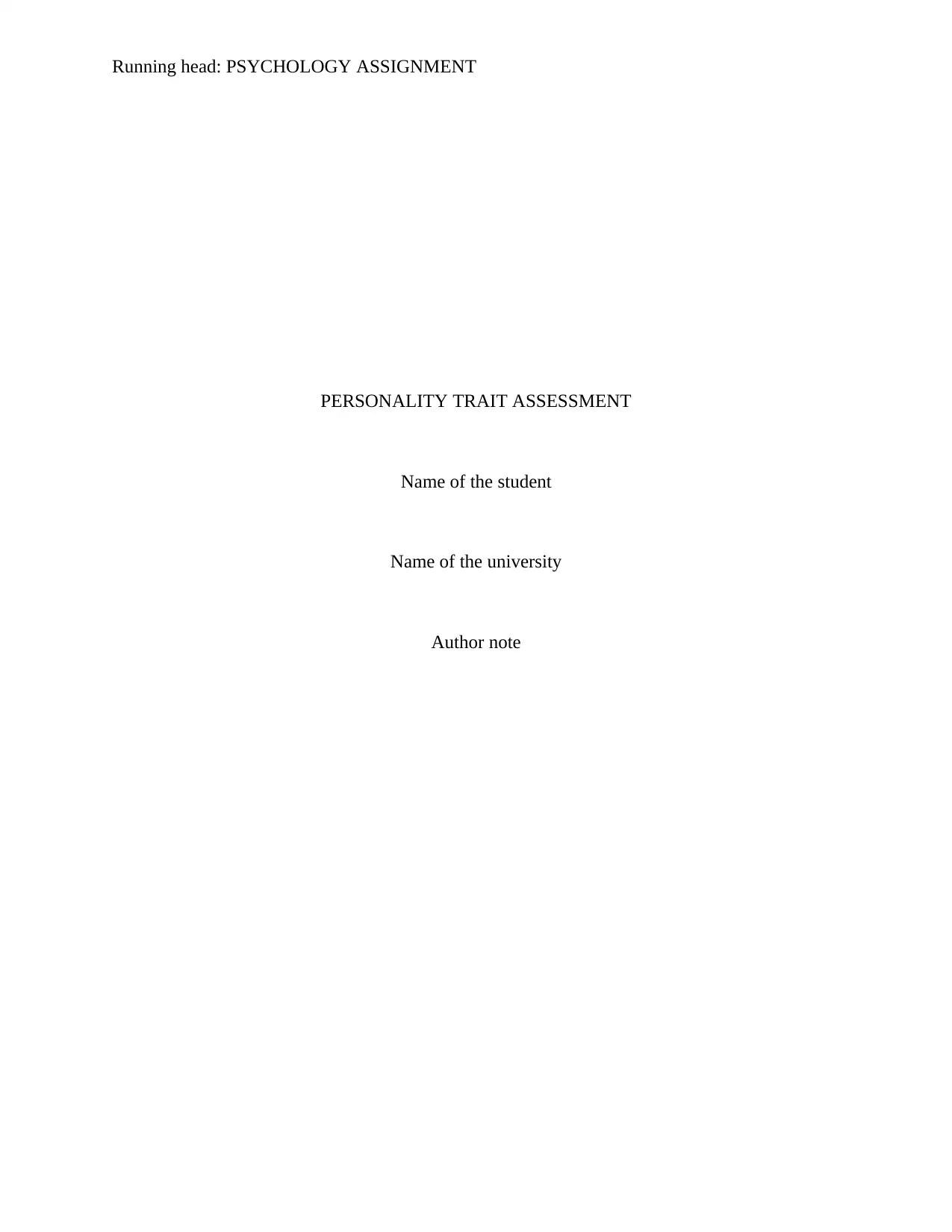
Running head: PSYCHOLOGY ASSIGNMENT
PERSONALITY TRAIT ASSESSMENT
Name of the student
Name of the university
Author note
PERSONALITY TRAIT ASSESSMENT
Name of the student
Name of the university
Author note
Paraphrase This Document
Need a fresh take? Get an instant paraphrase of this document with our AI Paraphraser
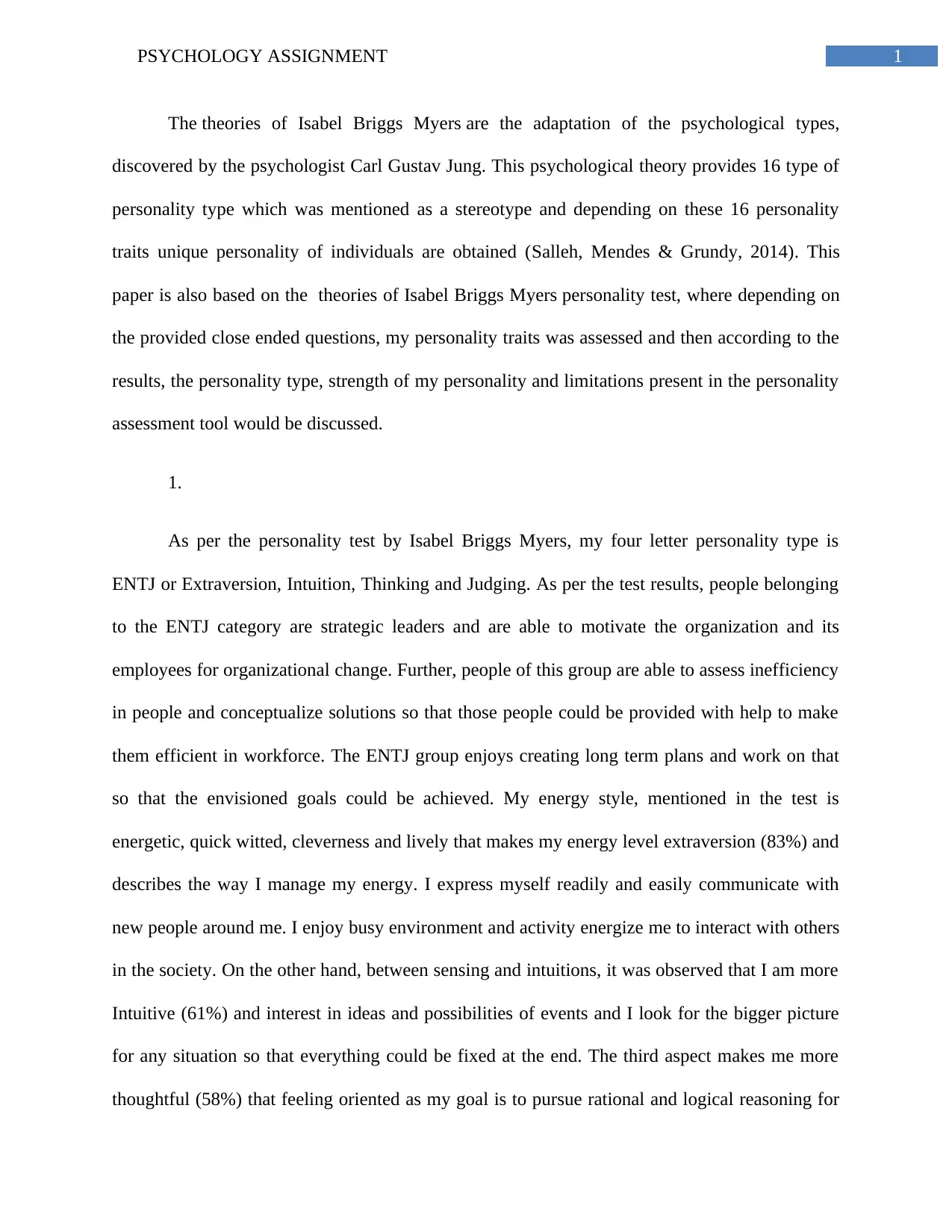
1PSYCHOLOGY ASSIGNMENT
The theories of Isabel Briggs Myers are the adaptation of the psychological types,
discovered by the psychologist Carl Gustav Jung. This psychological theory provides 16 type of
personality type which was mentioned as a stereotype and depending on these 16 personality
traits unique personality of individuals are obtained (Salleh, Mendes & Grundy, 2014). This
paper is also based on the theories of Isabel Briggs Myers personality test, where depending on
the provided close ended questions, my personality traits was assessed and then according to the
results, the personality type, strength of my personality and limitations present in the personality
assessment tool would be discussed.
1.
As per the personality test by Isabel Briggs Myers, my four letter personality type is
ENTJ or Extraversion, Intuition, Thinking and Judging. As per the test results, people belonging
to the ENTJ category are strategic leaders and are able to motivate the organization and its
employees for organizational change. Further, people of this group are able to assess inefficiency
in people and conceptualize solutions so that those people could be provided with help to make
them efficient in workforce. The ENTJ group enjoys creating long term plans and work on that
so that the envisioned goals could be achieved. My energy style, mentioned in the test is
energetic, quick witted, cleverness and lively that makes my energy level extraversion (83%) and
describes the way I manage my energy. I express myself readily and easily communicate with
new people around me. I enjoy busy environment and activity energize me to interact with others
in the society. On the other hand, between sensing and intuitions, it was observed that I am more
Intuitive (61%) and interest in ideas and possibilities of events and I look for the bigger picture
for any situation so that everything could be fixed at the end. The third aspect makes me more
thoughtful (58%) that feeling oriented as my goal is to pursue rational and logical reasoning for
The theories of Isabel Briggs Myers are the adaptation of the psychological types,
discovered by the psychologist Carl Gustav Jung. This psychological theory provides 16 type of
personality type which was mentioned as a stereotype and depending on these 16 personality
traits unique personality of individuals are obtained (Salleh, Mendes & Grundy, 2014). This
paper is also based on the theories of Isabel Briggs Myers personality test, where depending on
the provided close ended questions, my personality traits was assessed and then according to the
results, the personality type, strength of my personality and limitations present in the personality
assessment tool would be discussed.
1.
As per the personality test by Isabel Briggs Myers, my four letter personality type is
ENTJ or Extraversion, Intuition, Thinking and Judging. As per the test results, people belonging
to the ENTJ category are strategic leaders and are able to motivate the organization and its
employees for organizational change. Further, people of this group are able to assess inefficiency
in people and conceptualize solutions so that those people could be provided with help to make
them efficient in workforce. The ENTJ group enjoys creating long term plans and work on that
so that the envisioned goals could be achieved. My energy style, mentioned in the test is
energetic, quick witted, cleverness and lively that makes my energy level extraversion (83%) and
describes the way I manage my energy. I express myself readily and easily communicate with
new people around me. I enjoy busy environment and activity energize me to interact with others
in the society. On the other hand, between sensing and intuitions, it was observed that I am more
Intuitive (61%) and interest in ideas and possibilities of events and I look for the bigger picture
for any situation so that everything could be fixed at the end. The third aspect makes me more
thoughtful (58%) that feeling oriented as my goal is to pursue rational and logical reasoning for
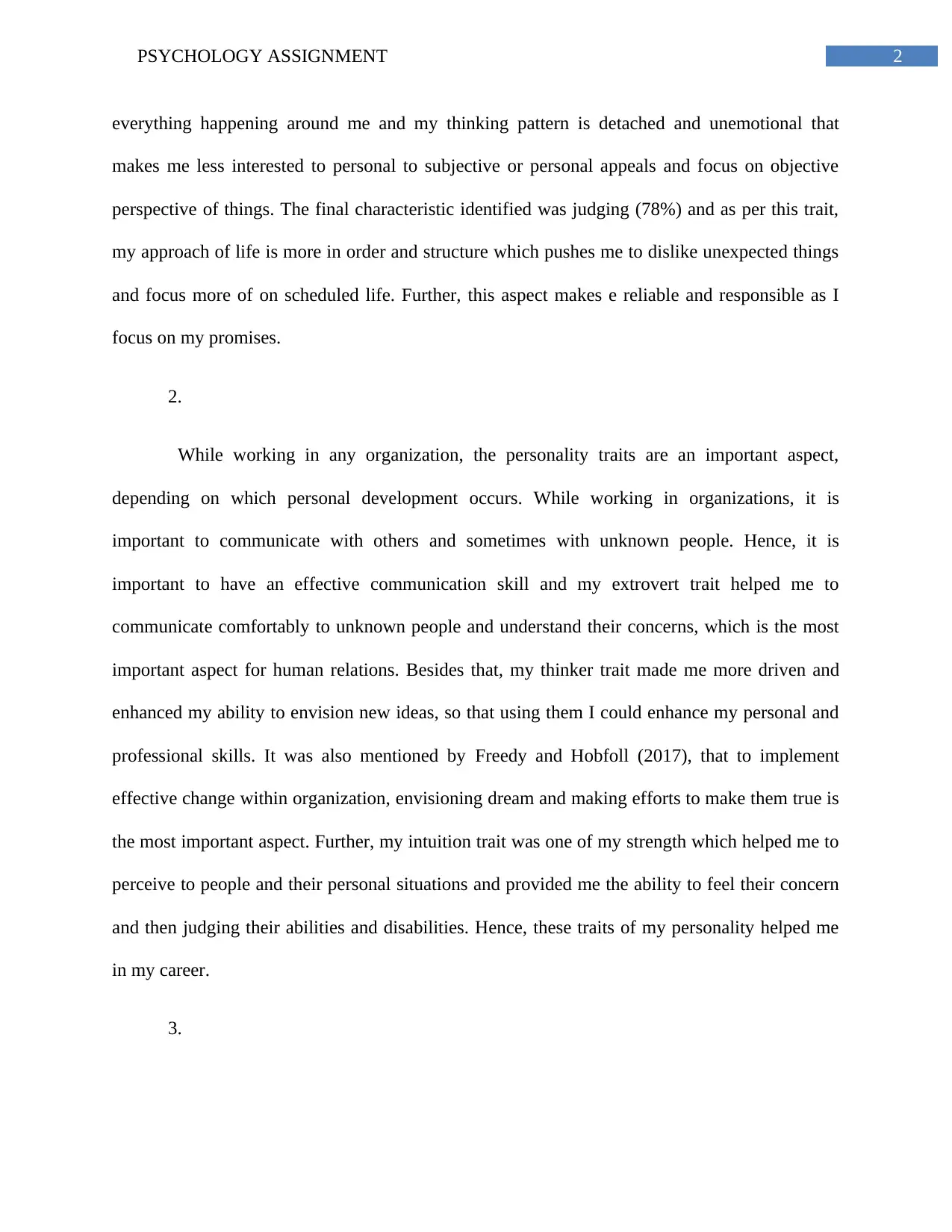
2PSYCHOLOGY ASSIGNMENT
everything happening around me and my thinking pattern is detached and unemotional that
makes me less interested to personal to subjective or personal appeals and focus on objective
perspective of things. The final characteristic identified was judging (78%) and as per this trait,
my approach of life is more in order and structure which pushes me to dislike unexpected things
and focus more of on scheduled life. Further, this aspect makes e reliable and responsible as I
focus on my promises.
2.
While working in any organization, the personality traits are an important aspect,
depending on which personal development occurs. While working in organizations, it is
important to communicate with others and sometimes with unknown people. Hence, it is
important to have an effective communication skill and my extrovert trait helped me to
communicate comfortably to unknown people and understand their concerns, which is the most
important aspect for human relations. Besides that, my thinker trait made me more driven and
enhanced my ability to envision new ideas, so that using them I could enhance my personal and
professional skills. It was also mentioned by Freedy and Hobfoll (2017), that to implement
effective change within organization, envisioning dream and making efforts to make them true is
the most important aspect. Further, my intuition trait was one of my strength which helped me to
perceive to people and their personal situations and provided me the ability to feel their concern
and then judging their abilities and disabilities. Hence, these traits of my personality helped me
in my career.
3.
everything happening around me and my thinking pattern is detached and unemotional that
makes me less interested to personal to subjective or personal appeals and focus on objective
perspective of things. The final characteristic identified was judging (78%) and as per this trait,
my approach of life is more in order and structure which pushes me to dislike unexpected things
and focus more of on scheduled life. Further, this aspect makes e reliable and responsible as I
focus on my promises.
2.
While working in any organization, the personality traits are an important aspect,
depending on which personal development occurs. While working in organizations, it is
important to communicate with others and sometimes with unknown people. Hence, it is
important to have an effective communication skill and my extrovert trait helped me to
communicate comfortably to unknown people and understand their concerns, which is the most
important aspect for human relations. Besides that, my thinker trait made me more driven and
enhanced my ability to envision new ideas, so that using them I could enhance my personal and
professional skills. It was also mentioned by Freedy and Hobfoll (2017), that to implement
effective change within organization, envisioning dream and making efforts to make them true is
the most important aspect. Further, my intuition trait was one of my strength which helped me to
perceive to people and their personal situations and provided me the ability to feel their concern
and then judging their abilities and disabilities. Hence, these traits of my personality helped me
in my career.
3.
⊘ This is a preview!⊘
Do you want full access?
Subscribe today to unlock all pages.

Trusted by 1+ million students worldwide
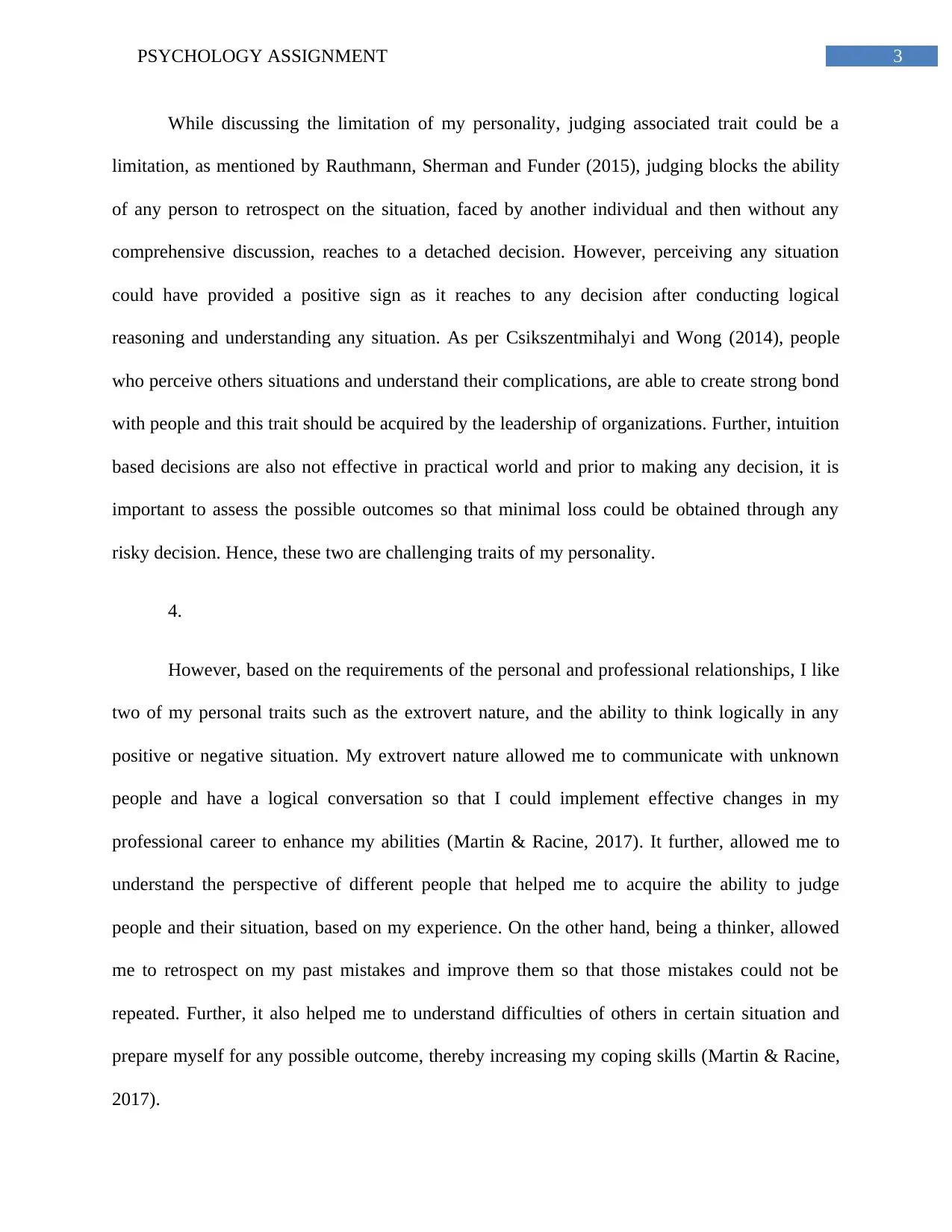
3PSYCHOLOGY ASSIGNMENT
While discussing the limitation of my personality, judging associated trait could be a
limitation, as mentioned by Rauthmann, Sherman and Funder (2015), judging blocks the ability
of any person to retrospect on the situation, faced by another individual and then without any
comprehensive discussion, reaches to a detached decision. However, perceiving any situation
could have provided a positive sign as it reaches to any decision after conducting logical
reasoning and understanding any situation. As per Csikszentmihalyi and Wong (2014), people
who perceive others situations and understand their complications, are able to create strong bond
with people and this trait should be acquired by the leadership of organizations. Further, intuition
based decisions are also not effective in practical world and prior to making any decision, it is
important to assess the possible outcomes so that minimal loss could be obtained through any
risky decision. Hence, these two are challenging traits of my personality.
4.
However, based on the requirements of the personal and professional relationships, I like
two of my personal traits such as the extrovert nature, and the ability to think logically in any
positive or negative situation. My extrovert nature allowed me to communicate with unknown
people and have a logical conversation so that I could implement effective changes in my
professional career to enhance my abilities (Martin & Racine, 2017). It further, allowed me to
understand the perspective of different people that helped me to acquire the ability to judge
people and their situation, based on my experience. On the other hand, being a thinker, allowed
me to retrospect on my past mistakes and improve them so that those mistakes could not be
repeated. Further, it also helped me to understand difficulties of others in certain situation and
prepare myself for any possible outcome, thereby increasing my coping skills (Martin & Racine,
2017).
While discussing the limitation of my personality, judging associated trait could be a
limitation, as mentioned by Rauthmann, Sherman and Funder (2015), judging blocks the ability
of any person to retrospect on the situation, faced by another individual and then without any
comprehensive discussion, reaches to a detached decision. However, perceiving any situation
could have provided a positive sign as it reaches to any decision after conducting logical
reasoning and understanding any situation. As per Csikszentmihalyi and Wong (2014), people
who perceive others situations and understand their complications, are able to create strong bond
with people and this trait should be acquired by the leadership of organizations. Further, intuition
based decisions are also not effective in practical world and prior to making any decision, it is
important to assess the possible outcomes so that minimal loss could be obtained through any
risky decision. Hence, these two are challenging traits of my personality.
4.
However, based on the requirements of the personal and professional relationships, I like
two of my personal traits such as the extrovert nature, and the ability to think logically in any
positive or negative situation. My extrovert nature allowed me to communicate with unknown
people and have a logical conversation so that I could implement effective changes in my
professional career to enhance my abilities (Martin & Racine, 2017). It further, allowed me to
understand the perspective of different people that helped me to acquire the ability to judge
people and their situation, based on my experience. On the other hand, being a thinker, allowed
me to retrospect on my past mistakes and improve them so that those mistakes could not be
repeated. Further, it also helped me to understand difficulties of others in certain situation and
prepare myself for any possible outcome, thereby increasing my coping skills (Martin & Racine,
2017).
Paraphrase This Document
Need a fresh take? Get an instant paraphrase of this document with our AI Paraphraser
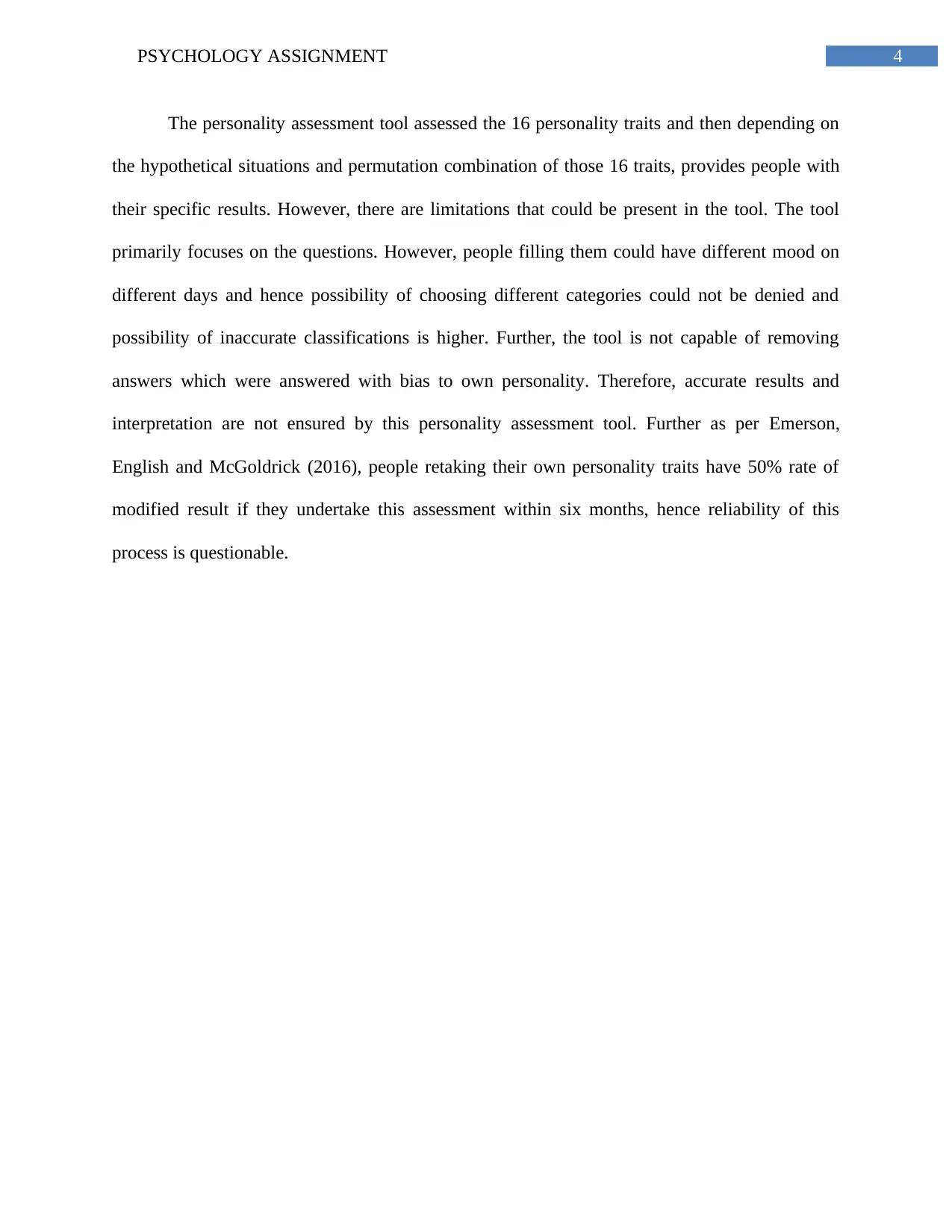
4PSYCHOLOGY ASSIGNMENT
The personality assessment tool assessed the 16 personality traits and then depending on
the hypothetical situations and permutation combination of those 16 traits, provides people with
their specific results. However, there are limitations that could be present in the tool. The tool
primarily focuses on the questions. However, people filling them could have different mood on
different days and hence possibility of choosing different categories could not be denied and
possibility of inaccurate classifications is higher. Further, the tool is not capable of removing
answers which were answered with bias to own personality. Therefore, accurate results and
interpretation are not ensured by this personality assessment tool. Further as per Emerson,
English and McGoldrick (2016), people retaking their own personality traits have 50% rate of
modified result if they undertake this assessment within six months, hence reliability of this
process is questionable.
The personality assessment tool assessed the 16 personality traits and then depending on
the hypothetical situations and permutation combination of those 16 traits, provides people with
their specific results. However, there are limitations that could be present in the tool. The tool
primarily focuses on the questions. However, people filling them could have different mood on
different days and hence possibility of choosing different categories could not be denied and
possibility of inaccurate classifications is higher. Further, the tool is not capable of removing
answers which were answered with bias to own personality. Therefore, accurate results and
interpretation are not ensured by this personality assessment tool. Further as per Emerson,
English and McGoldrick (2016), people retaking their own personality traits have 50% rate of
modified result if they undertake this assessment within six months, hence reliability of this
process is questionable.
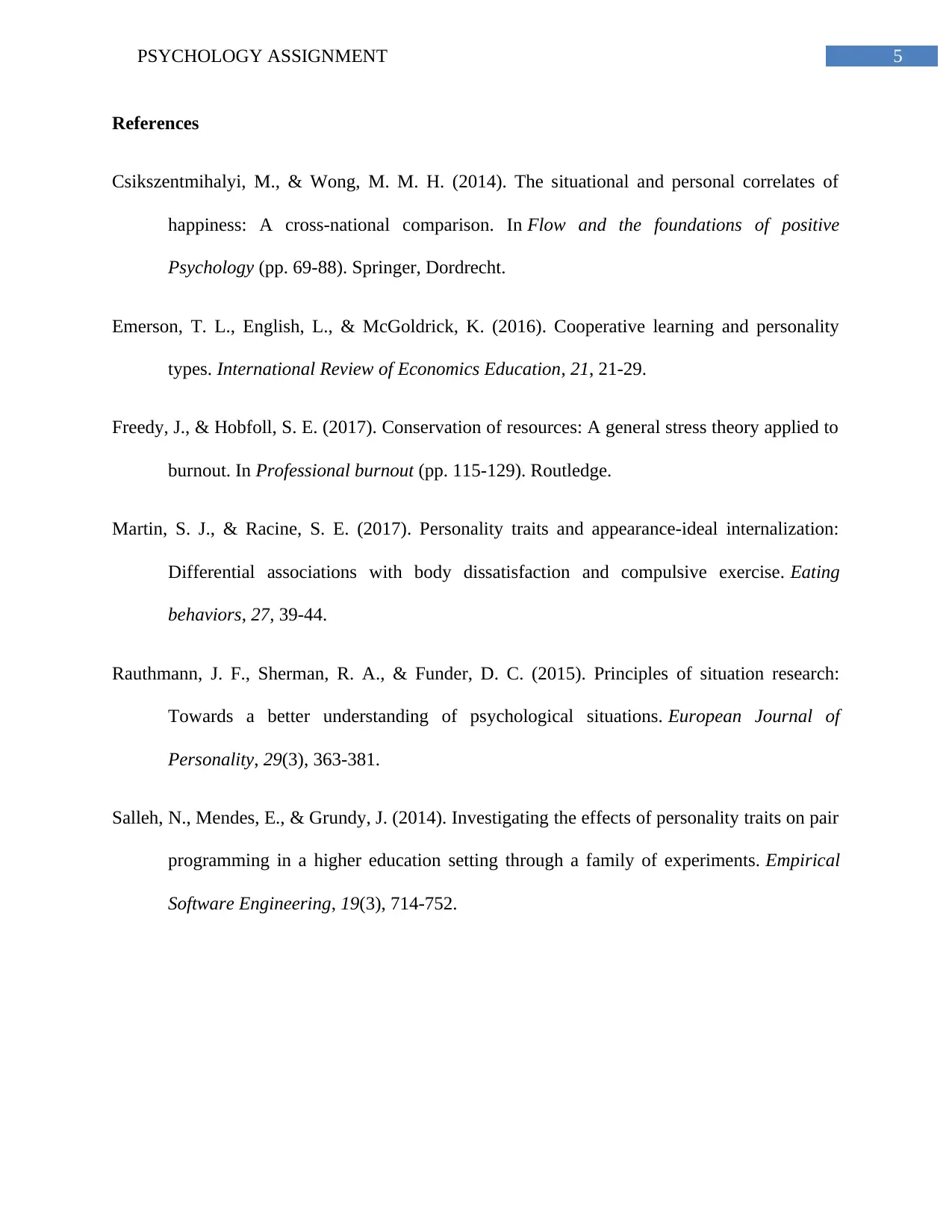
5PSYCHOLOGY ASSIGNMENT
References
Csikszentmihalyi, M., & Wong, M. M. H. (2014). The situational and personal correlates of
happiness: A cross-national comparison. In Flow and the foundations of positive
Psychology (pp. 69-88). Springer, Dordrecht.
Emerson, T. L., English, L., & McGoldrick, K. (2016). Cooperative learning and personality
types. International Review of Economics Education, 21, 21-29.
Freedy, J., & Hobfoll, S. E. (2017). Conservation of resources: A general stress theory applied to
burnout. In Professional burnout (pp. 115-129). Routledge.
Martin, S. J., & Racine, S. E. (2017). Personality traits and appearance-ideal internalization:
Differential associations with body dissatisfaction and compulsive exercise. Eating
behaviors, 27, 39-44.
Rauthmann, J. F., Sherman, R. A., & Funder, D. C. (2015). Principles of situation research:
Towards a better understanding of psychological situations. European Journal of
Personality, 29(3), 363-381.
Salleh, N., Mendes, E., & Grundy, J. (2014). Investigating the effects of personality traits on pair
programming in a higher education setting through a family of experiments. Empirical
Software Engineering, 19(3), 714-752.
References
Csikszentmihalyi, M., & Wong, M. M. H. (2014). The situational and personal correlates of
happiness: A cross-national comparison. In Flow and the foundations of positive
Psychology (pp. 69-88). Springer, Dordrecht.
Emerson, T. L., English, L., & McGoldrick, K. (2016). Cooperative learning and personality
types. International Review of Economics Education, 21, 21-29.
Freedy, J., & Hobfoll, S. E. (2017). Conservation of resources: A general stress theory applied to
burnout. In Professional burnout (pp. 115-129). Routledge.
Martin, S. J., & Racine, S. E. (2017). Personality traits and appearance-ideal internalization:
Differential associations with body dissatisfaction and compulsive exercise. Eating
behaviors, 27, 39-44.
Rauthmann, J. F., Sherman, R. A., & Funder, D. C. (2015). Principles of situation research:
Towards a better understanding of psychological situations. European Journal of
Personality, 29(3), 363-381.
Salleh, N., Mendes, E., & Grundy, J. (2014). Investigating the effects of personality traits on pair
programming in a higher education setting through a family of experiments. Empirical
Software Engineering, 19(3), 714-752.
⊘ This is a preview!⊘
Do you want full access?
Subscribe today to unlock all pages.

Trusted by 1+ million students worldwide
1 out of 6
Related Documents
Your All-in-One AI-Powered Toolkit for Academic Success.
+13062052269
info@desklib.com
Available 24*7 on WhatsApp / Email
![[object Object]](/_next/static/media/star-bottom.7253800d.svg)
Unlock your academic potential
Copyright © 2020–2026 A2Z Services. All Rights Reserved. Developed and managed by ZUCOL.





